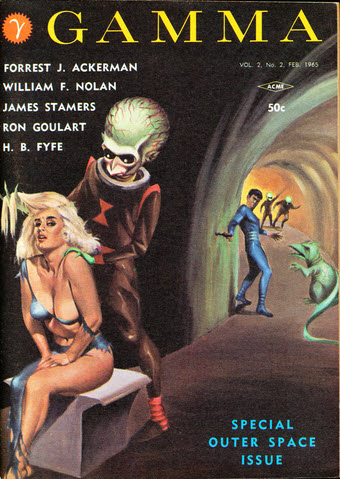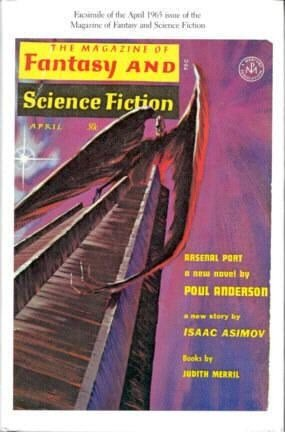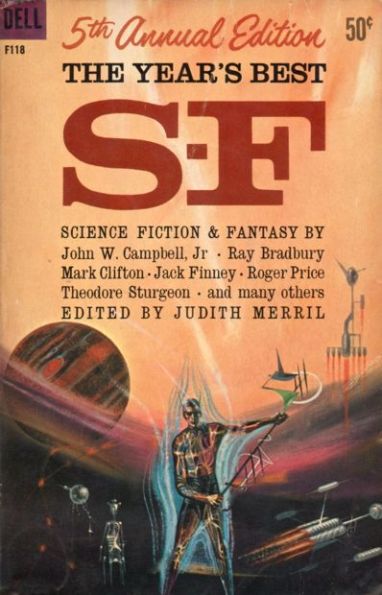 |
| Cover by Agosta Morol |
 |
| Cover by Fred Wolters |
 |
| Cover by Edmund Emshwiller ("Emsh") |
 |
| Cover by Gray Morrow |
 |
| Cover by John Healey |
 |
| Cover by Bert Tanner |
The notable facts of these issues are several, not least that John Brunner appears in the April issue of the Magazine of Horror, and any number of other fantastic-fiction issues at about this time (as the always-prolific Brunner was working up to some of the best work in his career); the March F&SF features one of Roger Zelazny's most important early stories, while the April issue is perhaps most significant as the first issue that Edward Ferman edited on his own (even though his father, publisher Joseph Ferman, still had the formal title of "editor" as he had since Davidson's resignation the previous year), not "using up" the inventory that Avram Davidson had purchased for the magazine, and introducing Gahan Wilson's first monthly cartoon (Wilson had contributed cartoons to Fantastic in the 1950s, as well as having already made a career for himself in Playboy, The New Yorker and other slick magazines by 1965)...Southern Illinois University Press published a facsimile of this issue in hardcover, with added memoirs by several of the contributors including Ferman, in 1981. Meanwhile, these were almost the last issues edited by the similarly important Cele Lalli, who had begun editorship of Fantastic and its stablemate Amazing as Cele Goldsmith; when the magazines were sold at mid-year to independent publisher Sol Cohen, as Cele G. Lalli she would stay with Ziff-Davis as a notable editor of bridal magazines. Here's a decent appreciation for some of the early issues of the Magazine of Horror, which Robert A. W. Lowndes was able to keep afloat from 1963-1971, and a more comprehensive one here...and not long after these issues, edited by Kyril Bonfiglioli with the help of fellow writer and artist Keith Roberts, the British institution Science Fantasy would change title to SF Impulse...while its elder sibling, New Worlds, underwent similar changes and eventually even greater ones...
Indices courtesy ISFDb:
Science Fantasy, March 1965
- Editor: Kyril Bonfiglioli
- Year: 1965-03-00
- Publisher: Roberts & Vinter Ltd.
- Price: 2/6
- Pages: 128
- Binding: mass-market paperback
- Type: MAGAZINE
- Contents
- 2 • Editorial (Science Fantasy, March 1965) • essay by Kyril Bonfiglioli
- 3 • The Outcast • novelette by Harry Harrison
- 31 • Song of the Syren • novelette by Robert Wells
- 61 • Moriarty • shortstory by Philip Wordley
- 73 • Bring Back a Life • novelette by John T. Phillifent [as by John Rackham]
- 97 • The Jennifer • [Anita] • shortstory by Keith Roberts
- 97 • The Jennifer • interior artwork by Keith Roberts [as by K. Roberts]
- 109 • A Cave in the Hills • shortstory by R. W. Mackelworth
- 122 • Hunt a Wild Dream (Part 1 of 2) • serial by D. R. Heywood
- Title: Science Fantasy, April 1965
- Editor: Kyril Bonfiglioli
- Year: 1965-04-00
- Contents
- 2 • Editorial (Science Fantasy, April 1965) • essay by Kyril Bonfiglioli
- 5 • Man in His Time • shortstory by Brian W. Aldiss [as by Brian Aldiss]
- 33 • The War at Foxhanger • [Anita] • shortstory by Keith Roberts
- 44 • The Chicken Switch • shortstory by Elleston Trevor
- 62 • Susan • shortstory by Keith Roberts [as by Alistair Bevan]
- 76 • The Excursion • novelette by Brian N. Ball [as by B. N. Ball]
- 117 • Over and Out • shortstory by George Hay
- 119 • Hunt a Wild Dream (Part 2 of 2) • serial by D. R. Heywood
Magazine of Horror, April 1965
- Editor: Robert A. W. Lowndes
- Year: 1965-04-00
- Publisher: Health Knowledge, Inc.
- Price: $0.50
- Pages: 132
- Binding: Digest
- Contents
- The Garrison • (1965) • shortstory by Donald A. Wollheim [as by David Grinnell]
- Orpheus's Brother • (1965) • shortstory by John Brunner
- The Lady of the Velvet Collar • (1824) • shortstory by Washington Irving (variant of The Adventure of the German Student)
- Passeur • (1897) • shortstory by Robert W. Chambers
- The Dead Who Walk • (1931) • novella by Ray Cummings
- The Burglar-Proof Vault • (1965) • shortstory by Oliver Taylor
- Jack • (1965) • shortstory by Reynold Junker
- The Black Laugh • (1932) • shortstory by William J. Makin
- Cassilda's Song • (1895) • poem by Robert W. Chambers
- The Hand of Glory • (0000) • poem by Richard Harris Barham [as by Thomas Ingoldsby]
- Title: Magazine of Horror, June 1965
- Editor: Robert A. W. Lowndes
- Year: 1965-06-00
- Contents
- 5 • The Night Wire • (1926) • shortstory by H. F. Arnold
- 12 • Sacrilege • (1965) • shortstory by Wallace West
- 27 • All the Stain of Long Delight • (1965) • shortstory by Jerome Clark
- 28 • Skulls in the Stars • [Solomon Kane] • (1929) • shortstory by Robert E. Howard
- 38 • The Photographs • (1900) • novelette by Richard Marsh
- 64 • The Distortion Out of Space • (1934) • shortstory by Francis Flagg
- 75 • Guarantee Period • (1965) • shortstory by William M. Danner
- 81 • The Door in the Wall • (1906) • shortstory by H. G. Wells
- 97 • The Three Low Masses • (1869) • shortstory by Alphonse Daudet (trans. of Les trois messes basses)
- 105 • The Whistling Room • [Carnacki (William Hope Hodgson)] • (1910) • shortstory by William Hope Hodgson
- Editors: Joseph W. Ferman (actually Edward Ferman)
- Year: 1965-03-00
- Publisher: Mercury Press, Inc.
- Price: $0.50
- Pages: 132
- Binding: Digest
- Contents
- 4 • The Doors of His Face, the Lamps of His Mouth • novelette by Roger Zelazny
- 31 • Final Appeal • shortstory by Herbie Brennan [as by J. H. Brennan]
- 39 • Low-Level Weather • [The Science Springboard] • essay by Theodore L. Thomas
- 40 • Essentials Only • shortstory by Jack Sharkey
- 53 • Books (F&SF, March 1965) • [Books (F&SF)] • essay by Judith Merril
- 54 • Review: The Rest of the Robots by Isaac Asimov • review by Judith Merril
- 54 • Review: Sturgeon in Orbit by Theodore Sturgeon • review by Judith Merril
- 55 • Review: Doctor to the Stars by Murray Leinster • review by Judith Merril
- 55 • Review: Shock II by Richard Matheson • review by Judith Merril
- 56 • Review: A Pail of Air by Fritz Leiber • review by Judith Merril
- 57 • Review: The Planet Buyer by Cordwainer Smith • review by Judith Merril
- 57 • Review: Regan's Planet by Robert Silverberg • review by Judith Merril
- 57 • Review: The Great Time Machine Hoax by Keith Laumer • review by Judith Merril
- 58 • Review: ESP, A Personal Memoir by Rosalind Heywood • review by Judith Merril
- 60 • The End of Eternity • shortstory by Ernesto Gastaldi
- 65 • Tripsych • shortstory by Ron Smith
- 70 • Illusion • poem by Walter H. Kerr
- 71 • Better Than Ever • shortstory by Alex Kirs
- 80 • Oh, East Is West and West Is East - • [Asimov's Essays: F&SF] • essay by Isaac Asimov
- 90 • Ado About Nothing • shortstory by Robert K. Ottum [as by Bob Ottum, Jr.]
- 93 • Uncollected Works • shortstory by Lin Carter
- 103 • Maiden Voyage • novelette by J. W. Schutz
- 128 • The Dramatic Ray Bradbury • essay by uncredited
- Title: The Magazine of Fantasy and Science Fiction, April 1965
- Editor: Edward Ferman
- Year: 1965-04-00
- Contents
- 5 • Arsenal Port • [Gunnar Heim] • novella by Poul Anderson
- 59 • Cartoon: "This is Willy, and this is Willy's imaginary playmate." • interior artwork by Gahan Wilson
- 60 • Keep Them Happy • shortstory by Robert Rohrer
- 67 • Imaginary Numbers in a Real Garden • poem by Gerald Jonas
- 68 • Books (F&SF, April 1965) • [Books (F&SF)] • essay by Judith Merril
- 69 • Review: The Day New York Went Dry by Charles Einstein • review by Judith Merril
- 70 • Review: Sweeney's Island by John Christopher • review by Judith Merril
- 70 • Review: The Mind Benders by James Kennaway • review by Judith Merril
- 71 • Review: The Worlds of Robert F. Young by Robert F. Young • review by Judith Merril
- 71 • Review: Short Friday and Other Stories by Isaac Bashevis Singer • review by Judith Merril
- 72 • Review: The Spire by William Golding • review by Judith Merril
- 72 • Review: The Ambidextrous Universe by Martin Gardner • review by Judith Merril
- 72 • Review: The Fair by Robert Nathan • review by Judith Merril
- 73 • Review: The 9th Annual of the Year's Best S-F by Judith Merril • review by Basil Davenport
- 75 • Blind Date • shortstory by T. P. Caravan [as by TP Caravan]
- 81 • The Ice Ages • [The Science Springboard] • essay by Theodore L. Thomas
- 82 • The History of Doctor Frost • shortstory by Roderic C. Hodgins
- 95 • Lord Moon • [Lord Moon] • shortstory by M. J. Engh [as by Jane Beauclerk]
- 104 • The Certainty of Uncertainty • [Asimov's Essays: F&SF] • essay by Isaac Asimov
- 115 • Eyes Do More Than See • shortstory by Isaac Asimov
- 118 • Aunt Millicent at the Races • shortstory by Len Guttridge
Fantastic: Stories of Imagination, March 1965
- Editor: Cele G. Lalli
- Year: 1965-03-00
- Contents
- 5 • Guest Editorial: Monsters & Monster-Lovers • essay by Fritz Leiber
- 6 • The Pillars of Chambalor • [Brak] • shortstory by John Jakes
- 7 • The Pillars of Chambalor • interior artwork by Gray Morrow
- 22 • Mary, Mary • shortstory by John Baldwinson
- 31 • 102 H-Bombs • novelette by Thomas M. Disch
- 57 • Look Out Below • shortstory by Jack Sharkey
- 63 • The Headsman • novelette by Irvin Ashkenazy
- 98 • The Man Who Painted Tomorrow • shortstory by Kate Wilhelm
- 114 • Review: Almuric by Robert E. Howard • review by Robert Silverberg
- 114 • Fantasy Books (Fantastic, March 1965) • [Fantasy Books (Fantastic)] • essay by Robert Silverberg
- 115 • Review: The Reign of Wizardry by Jack Williamson • review by Robert Silverberg
- 115 • Review: The Day the World Ended by Sax Rohmer • review by Robert Silverberg
- 116 • Review: Who Fears the Devil? by Manly Wade Wellman • review by Robert Silverberg
- 116 • Review: Valley of the Flame by Henry Kuttner • review by Robert Silverberg
- Title: Fantastic: Stories of Imagination, April 1965
- Editor: Cele G. Lalli
- Year: 1965-04-00
- Contents
- 6 • Editorial (Fantastic, April 1965) • essay by uncredited (presumably Norman Lobsenz)
- 7 • Bright Eyes • shortstory by Harlan Ellison
- 9 • Bright Eyes • interior artwork by Dennis Smith
- 19 • The Purpose of Merlin • shortstory by Colin R. Fry
- 32 • The Other Side of Time (Part 1 of 3) • [Imperium • 2] • serial by Keith Laumer
- 89 • The Dreamer • shortstory by Walter F. Moudy
- 98 • Trouble with Hyperspace • shortstory by Jack Sharkey
- 101 • The Silk of Shaitan • [Brak] • shortstory by John Jakes
- 117 • Predator • shortstory by Robert Rohrer
- 125 • Fantasy Books (Fantastic, April 1965) • [Fantasy Books (Fantastic)] • essay by Robert Silverberg
- 125 • Review: The Best Ghost Stories of J. S. Le Fanu by Joseph Sheridan Le Fanu • review by Robert Silverberg
- 126 • Review: The Radio Beasts by Ralph Milne Farley • review by Robert Silverberg
- 126 • Review: The Blind Spot by Austin Hall and Homer Eon Flint • review by Robert Silverberg
- 127 • Review: Atlantida by Pierre Benoit • review by Robert Silverberg
Gamma, February 1965
- Editors: Charles E. Fritch , Jack Matcha
- Year: 1965-02-00
- Publisher: Star Press, Inc.
- Price: $0.50
- Pages: 132
- Binding: Digest
- Contents
- 2 • Remember . . . . • essay by uncredited
- 3 • The Clutches of Ruin • novelette by H. B. Fyfe
- 38 • The Towers of Kagasi • shortstory by William P. Miller
- 55 • Food • shortstory by Ray Nelson
- 63 • Hans Off in Free Pfall to the Moon (abridged) • shortstory by Edgar Allan Poe (variant of Hans Phaall — A Tale 1835) [as by Edgar Allan Poe and unknown]
- 77 • The Gamma Interview: Forrest J. Ackerman • interview of Forrest J. Ackerman • interview by uncredited
- 84 • Open Season • shortstory by Jack Matcha [as by John Tanner]
- 96 • The Woman Astronaut • play by Robert Katz
- 101 • Happily Ever After • shortstory by William F. Nolan
- 106 • Don't Touch Me I'm Sensitive • shortstory by James Stamers
- 121 • The Hand of Dr. Insidious • shortstory by Ron Goulart
- Title: Gamma, September 1965
- Editors: Charles E. Fritch , Jack Matcha
- Year: 1965-09-00
- Contents
- fep • untitled • interior artwork by William F. Nolan
- 2 • Across the Editor's Desk • essay by uncredited
- 3 • Nesbit • novella by Ron Goulart
- 67 • Policy Conference • shortstory by Sylvia Dees and Ted White
- 69 • untitled • interior artwork by Luan Meatheringham
- 80 • Auto Suggestion • shortstory by Charles Beaumont
- 82 • Welcome to Procyon IV • shortstory by Charles E. Fritch [as by Chester H. Carlfi]
- 86 • Interest • shortstory by Richard Matheson
- 96 • untitled • interior artwork by Bernie Zuber [as by Bernard Zuber]
- 97 • Lullaby and Goodnight • shortstory by George Clayton Johnson
- 102 • A Careful Man Dies • (1946) • shortstory by Ray Bradbury
- 115 • The Late Mr. Adams • (1955) • shortstory by Steve Allen
- 118 • Wet Season • shortstory by Dennis Etchison
- bep • untitled • interior artwork by Burt Shonberg
 |
| Cover by Gray Morrow |
 |
| Cover by Fred Wolters |
 |
| Cover uncredited (perhaps a rush job by Keith Roberts) |
 |
| Cover by John Healey, which would be recycled much later by Mike Shayne Mystery Magazine, then also under the editorship of Charles Fritch |






